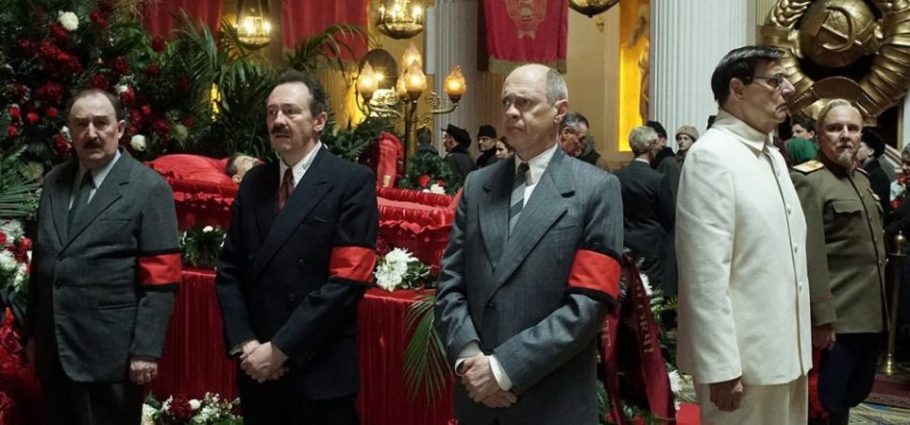| Worth seeing: | for Jeffrey Tambor and Steve Buscemi facing off to become the most powerful man behind the Iron Curtain in Armando Iannucci's absurdist take on a key moment in twentieth century Soviet history |

| Director: | Armando Iannucci |
| Featuring: | Jeffrey Tambor, Michael Palin, Paul Whitehouse, Simon Russell Beale, Steve Buscemi, Adrian McLoughlin, Andrea Riseborough, Daniel Tuite, Dermot Crowley, Emilio Iannucci, Gerald Lepkowski, Jason Isaacs, Jonathan Aris, Justin Edwards, Olga Kurylenko, Paddy Considine, Paul Chahidi, Richard Brake, Roger Ashton-Griffiths, Rupert Friend |
| Length: | 107 minutes |
| Certificate: | 15 |
| Country: | France, UK |
| Released: | 20th October 2017 |
WHAT’S IT ABOUT?
It’s the early 1950s and the Soviet Union’s feared dictator Stalin is at the height of his powers. Comrades within his own inner circle are as petrified of putting a foot wrong as members of the public in a society where torture, lifelong imprisonment and state-sanctioned murder are as rife as they are trumpeted.
But when he suddenly collapses, dead, in his office, the jostling for position begins. His deputy, Georgy Malenkov (Jeffrey Tambor), takes over in the interim, the head of the secret service Lavrentiy Beria (Simon Russell Beale) starts to exercise his power, and other members of the Central Command, such as Nikita Khrushchev (Steve Buscemi) raise their heads above the parapet.
Alliances are formed, as all the prospective successors try to win the support of the military, under Georgy Zhukov (Jason Isaacs).
In public – the group tries to ensure an orderly transfer of power after three turblent decades and continuity of the communist ideal, while behind closed doors, the protagonists are scrapping around like children – wielding the frightening power that comes with leading the largest country in the world.
WHAT’S IT LIKE?
This doesn’t sound like a recipe for a comedy, and it’s even a stretch to imagine how a writer with the cutting political insight of Armando Iannucci could manage to turn this moment of mid-twentieth century Russian history into something other than a dry drama.
Best known for TV shows and films that rip open the smooth veneer of politics – on both sides of the Atlantic – with such hits as America’s Veep, our The Thick of It and its big-screen version, In The Loop, that straddles both sides of the pond, most of his targets have – until now – been familiar to his largely English-speaking audiences.
It’s not entirely clear what to make of this somewhat peculiar confection – unlike his earlier work, it’s more of a parody than a satire, giving him the freedom to push the events closer to the realms of absurdity. But while the comedy is a little broader than you might expect from the subject matter, with the ever-present threat of torture and execution lingering in the background, there’s a necessarily dark but oddly comfortable undertone.
To blend such a sense of terror with what verges on slapstick without feeling glib or offensive is no mean feat.
The casting is a triumph with key roles filled by a delightfully deadpan Jeffrey Tambor, the white-cold calm of Simon Russell Beale, the manic Steve Buscemi, the ebullient Jason Isaacs and other British comic talent from Michael Palin to Paul Whitehouse and Iannucci sensibly eschews any thought of linguistic authenticity by allowing them – or most of them, at least – to adopt their native accents, rather than mock-Russian.
The power-play between the characters is fascinating in its historical context, as they variously wield the axe, raise a shield, subtly thrust a dagger or watch their own back – using violence and threats to coerce others – while maintaining a gently surreal and latently black sense of humour.
Iannucci has delivered a bold and highly entertaining film about a subject you’d never imagine could be such fertile source material – politics, death, fear and paranoia – and he’s confounded expectations by skilfully making a gently surreal but chilling comedy about a group of characters responsible for brutally murdering millions of their own people.
How true it is to life we can only imagine, but you’ll certainly come away feeling that you’ve been a little educated, although there’s a sense in which – with a wordy script and much of the action, or more accurately discussion, confined mostly to Moscow’s power-broking interiors – it feels like the drama might have unfolded more comfortably on the stage than the big screen.
